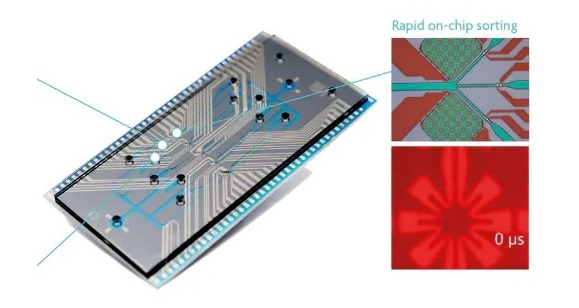Cell Sorter Chip Technology to Pave Way for Immune Profiling at POC
February 7, 2024
Source: drugdu
 310
310

Monitoring the response of the immune system of cancer patients during disease and treatment is important for achieving favorable outcomes. To do this, labs utilize flow cytometry to perform immune profiling, which involves identifying and quantifying a patient's immune cells at a specific time. This information is vital for determining the most effective treatment for a cancer patient. Continuing this profiling during treatment helps clinicians understand how well the treatment is working. Despite the promise of immune profiling in guiding therapy being a burgeoning area in cancer research and treatment, it hasn’t been widely adopted in clinical practice due to the high cost, large size, and complexity of flow cytometry equipment. These machines are confined to specialized labs, and transporting blood samples to these facilities is time-consuming and requires special conditions to keep the cells viable, making routine monitoring of cancer patients challenging. Now, a novel cell sorter chip technology could bring immune monitoring to clinical practice for creating a truly personalized cancer treatment plan.
Researchers at IMEC (Leuven, Belgium) have developed a cytometry and cell sorter technology that channels a sample with fluorescently labeled cells through microfluidic channels on a chip. The cells are guided towards an excitation laser, a detection unit, and a sorting junction, where target cells are directed into a side channel using vapor bubbles created by microheaters in a water-filled microchamber. The target cells can then be collected and quantified at the end of this fluidic side channel. This technology could allow oncologists to use a portable tool, about the size of a lunchbox, in their office or daycare center to periodically check a patient’s immune system.
The process would involve taking a drop of blood and inserting the chip cartridge into an analyzing desktop tool, with results available within minutes. The chip, produced using standard chip technology on 200mm silicon wafers, can be mass-produced at an affordable cost, making it disposable if necessary to avoid cross-sample contamination. Additionally, the fabrication process allows for multiple microfluidic channels per chip, enabling high throughput without sacrificing sensitivity. This could mean a complete immune signature in as little as 10 minutes. By comparing these immune signatures to larger datasets, oncologists can quickly determine if a therapeutic effect is achieved.
In the first clinical validation of the cell sorter chip technology, IMEC researchers along with their colleagues at KU Leuven (Leuven, Belgium) set out to investigate whether it could identify and quantify immune cells as effectively as flow cytometry equipment. They chose to study CD8+PD-1+ T-cells, a type of cell that displays both CD8 and PD-1 proteins on its surface. CD8 signifies the cells as cytotoxic T-cells, essential for recognizing and destroying targets like cancer cells. PD-1 is a protein that regulates T-cell activity, maintaining immune balance after an invader is attacked. However, cancer cells can manipulate this pathway by overexpressing PD-1 ligands, suppressing the immune response, and allowing unchecked growth. Analyzing PD-1 positive T-cells in a cancer patient's blood can indicate whether the cancer employs this immune evasion strategy.
In such cases, immune checkpoint inhibitor drugs can be used to prevent PD-1 proteins on T-cells from binding with tumor-produced PD-1 ligands, restoring the T-cells’ ability to attack the cancer cells. The chip accurately identified PD-1 positive T-cells in blood samples from 15 ovarian cancer patients, matching the accuracy of conventional, expensive flow cytometry equipment like FACS. This achievement marks a significant step towards developing a point-of-care tool for immune profiling, a groundbreaking advancement in cancer therapy that aims to customize treatment plans for each patient.
“With cancer, you don’t want to lose precious time by giving the patient an expensive therapy that doesn’t work. This is certainly true for ovarian cancer. This kind of cancer is mostly detected at a very late stage because the tumor has a lot of ‘free’ space to grow in the abdominal cavity before the patient will experience this as pain,” said An Coosemans, MD Ph.D., professor at KU Leuven and heading the Laboratory on Tumor Immunology and Immunotherapy. “Imec’s cell sorter technology has the potential to provide oncologists with a tool to do initial and repeated immune profiling to choose the most effective treatment.”
Source:
By editorRead more on
- Gusekirumab Injection Accepted by CDE, Multiple Pipelines Advancing Simultaneously March 4, 2026
- Yifan Pharmaceutical’s teriparatide injection has been accepted by the CDE (Center for Drug Evaluation), adding a new domestic player to the osteoporosis treatment field March 4, 2026
- //news.yaozh.com/archive/47318.html PD-1 sales surge March 4, 2026
- A major breakthrough! Roche’s oral BTK inhibitor achieves its third Phase III clinical trial victory, a game-changer in the multi-billion dollar MS (manufactured pharmaceuticals) market. March 4, 2026
- GB19 Injection Approved for Clinical Trials of Cutaneous Lupus Erythematosus March 4, 2026
your submission has already been received.
OK
Subscribe
Please enter a valid Email address!
Submit
The most relevant industry news & insight will be sent to you every two weeks.



